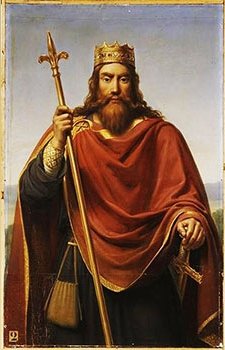
I wanted to do a thread on the complex relationship between civil wars and barbarian invasions in the last decades of the Western Roman Empire. I decided to illustrate this through the life of one man: Aegidius, a Roman general who made himself an independent ruler: 

Aegidius began as a loyal supporter of Majorian, one of the last capable western emperors, who took power in 457. The two men had served together in the army, and Aegidius was made Magister Militum per Gallias - commander of Roman forces in Gaul. 

They had their work cut out for them. By this point, Rome had lost control of much of its territory to semi-independent barbarian kingdoms, including the critical breadbasket of North Africa. They had to force these rulers to submit to imperial authority. 

On paper, Aegidius had 32,000 professional soldiers, along with units of border guards. By the 450s, however, decades of war had reduced this the a fraction of its former size. Although he still had some professionals, he was forced to rely heavily on mercenaries and allies. 

Fortunately, he was a brilliant commander. While the emperor reformed the government and prepared an invasion of Africa, Aegidius defeated the Burgundians and the Visigoths, forcing both to submit to Rome.
However, the invasion of Africa was betrayed to the Vandals by a traitor and defeated. Majorian was unpopular with the senate, who he taxed heavily to rebuild the army. In 461, he was killed by a conspiracy involving them and his barbarian general, Ricimer.
Ricimer put a puppet emperor on the throne, Libius Severus, but Aegidius refused to recognize him, breaking Gaul away and preparing to invade Italy. 

We don't know what Aegidius called his new regime. The Frankish historian Gregory of Tours calls him "king of the Romans;" other sources just call him general or tyrant. Whatever he called himself, he persuaded the Gallic field army and the Gallo-Roman aristocracy to follow him.
Curiously, Gregory also says that when the Salian Franks exiled their king, Childeric I, for sexual indiscretion, they elected Aegidius as king of the Franks until he returned. Whatever the truth of this, Aegidius used his close relationship with the Franks to great effect. 

Ricimer lacked the resources to invade Gaul, but he got the Visigoths to do so on his behalf. Aegidius put his military skills to great use, however, and with the old Gallic professionals and his Frankish allies crushed them at Orleans in 463, killing their commander.
Aegidius died under mysterious circumstances shortly afterwards, leaving his territory to his son, Syagrius, who established a capital at Soissons and maintained an independent realm that survived the overthrow of the last Western Emperor in 476. 

We don't have many sources for this "Domain of Soissons," but it it was powerful enough to send ambassadors to Constantinople and finds of Frankish artifacts drop off sharply at its borders. It remained powerful enough to hold off the Germanic kingdoms surrounding it.
Unfortunately, Syagrius' luck ran out. Under Childeric's son, Clovis, the peace with the Franks ended and he invaded Soissons in 486. Syagrius was confident enough that he marched out of the city walls to face Clovis in open battle, but was decisively defeated. 

He fled to the court of the Visigoths, but they handed him over to Clovis, who had him executed. Despite this, Clovis allowed Syagrius' family to keep both their lives and probably their lands, incorporating Soissons into his Frankish kingdom. 

Clovis ultimately converted to Catholicism and preserved many old Roman institutions. The Byzantine historian Procopius, writing in the mid 6th century, records the descendants of Roman troops fighting for the Franks in their old uniforms under their old standards.
Although it was ultimately short-lived, Aegidius and Syagrius built the last enclave of the Western Roman Empire, surviving its final emperor, that held off numerous barbarian attacks. My sources for this thread are Late Roman Warlords by Penny McGeorge, Patricians and Emperors
by Ian Hughes, The History of the Franks by Gregory of Tours and the Wars of Justinian by Procopius. Good day and God bless!
• • •
Missing some Tweet in this thread? You can try to
force a refresh





